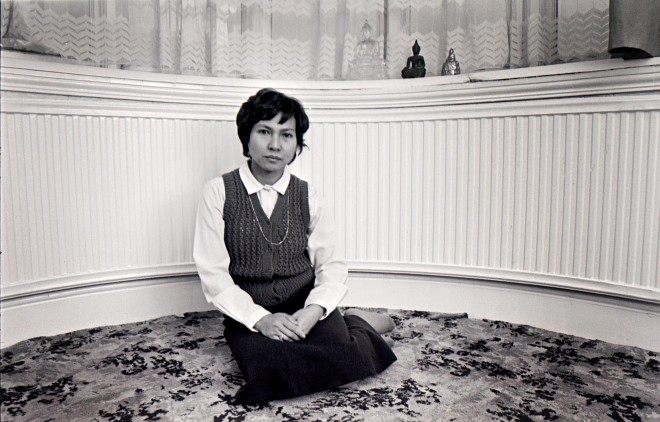Note
The following is a copy of an article – with
minor edits – that I originally posted on
Blogger.com, June 12, 2011:
https://paultrafford.blogspot.co.uk/2011/06/county-express-interview-with-fuengsin.html
The Internet and, especially, the Web are enabling old lines of investigation to be reopened with possibilities of new finds – for all kinds of detectives, including biographers! In March 1981, Fuengsin was interviewed for the County Express, which was published, as far as I can recall, in Stourbridge and Kidderminster. Jill Skelding was the reporter and she came round to our house with a photographer, Phil Loach; I can’t remember them myself, so I expect it took place during the day whilst I was at school. The article was part of a series called Woman to Woman and this particular interview was entitled: Buddhism as a way of life. It was published on Friday 13th March 1981.
I thought that it would be a good time to reproduce the article online (I don’t think the paper is in circulation under that name any more; it may have become Stourbridge News). We kept a few cuttings, but even if we had preserved them in mint condition, the newspaper medium meant that photographic reproduction was limited in quality. Fortunately, Google came to the rescue (again) and 30 years after the interview I was able to locate Phil, who is still in the photography business with The Silver Image. What’s more he was able to send me a pretty good scan (a larger version of the one online). So the complete article is available to view.
Here I’d just like to highlight a few things my mother said.
It’s really quite a typical piece – finding the mundane and profound in the everyday and the present moment. You get a taste of something unusual in the first two paragraphs, though it’s definitely more mundane in flavour!
With an impressive Oriental family history spanning several centuries and an unusual childhood spent in Thailand, there’s nothing Fuengsin likes better than to disappear to the depths of her kitchen and cook … spotted dick steamed pudding!
Mrs. Fuengsin Trafford, who lives in West Hagley, came to England 17 years ago, in her mid-twenties, from her home town near Bangkok. She studied at London University – and soon found she had a weakness for English food.
The kitchen wasn’t always frequented with such endeavour. One of my mother’s childhood friends said that the two of them used to play cooking. I asked whether that was because in reality they didn’t do any cooking and she nodded and grinned! In fact my father taught her some of the basics English cookery – there was little indication that she could later produce a cookery book! And as for her regard of the culinary offerings of this new land, the initial response was typically to bring out a tin of red chilli powder … at breakfast!
There’s a brief summary of how she came to the UK as a student, met my father, married, and settled in the UK. When she left Thailand in the early to mid 60s, Thonburi, where she grew up, was still separate from Bangkok on the other side of the Chao Phraya river and certainly was not so developed. We spent our first family holiday there in 1972, and there was a lot of change already by that time, but looking at photos from that period still shows many areas of fruit cultivation. Fuengsin did not return next to Thailand until after the interview, so she probably had nostalgic recollections in mind when she recalled:
“By that time my father had died, but my mother and Anthony got on remarkably well – the pace of life is so different out there, it’s hard for anyone from the Western world to understand it immediately.”
“The pace of life in Thailand is much slower than here in England – there just isn’t much stress, or traffic come to think of it!”
Our next family trip was in 1988 and I think we all found the new Bangkok somewhat overwhelming.
The article then moves on to discuss my mother’s Buddhist outlook, which is clearly the theme of the photograph, which shows her in a quite serious pose seated underneath three Buddha rupas. Fuengsin’s characteristic directness is clearly recorded:
“Buddhism is something that has to be achieved by the individual – but once you have reached that point you will have enlightenment.
“It isn’t a Sundays-only type of religion, and I know it’s hard for people who know nothing of Buddhism to even to begin to understand what it’s all about, but basically, no one can tell you how to practise Buddhism, it’s something the individual must learn for him or herself.
“It has to come from inside a person, and it is a very personal thing – no one can help you with it, and you can only practise Buddhism though life itself.
“It is closely linked with meditation and when you meditate you look at a figure of a Buddha and bow – that way you are aiming to suppress your ego, and get rid of any pride. Once you are rid of that you are at one with the universe.”
She had a very practical approach to Dhamma and these teachings are really core to the article, including the value of service. It’s mentioned that Fuengsin taught English to Asian immigrants – I recall she said these were elderly Pakistani ladies and that she was a member of a volunteer group (she didn’t even get her bus fare paid). I’m sure my mother would have had a quip about ‘Big Society’!
The article concludes by switching back to food and more steamed puddings. I think my father and I must accept some responsibility for this – we created quite a demand for puddings and cakes!
You are welcome to read the interview …

